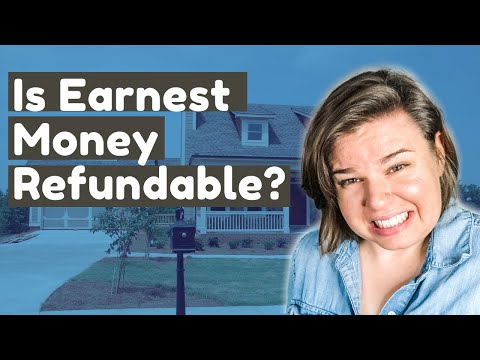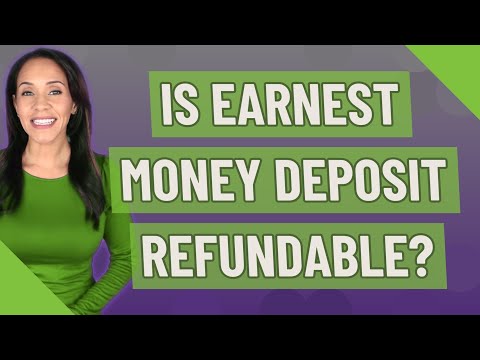Understanding “Is Earnest Money Refundable?” in Today’s Real Estate Market
The question “is earnest money refundable?” is on the lips of almost every homebuyer in today’s real estate market. Rightly so! After all, you’re considering entering into one of the largest financial transactions of your life.
Key Concepts: Earnest Money, EMD Real Estate, and the Modern Buyer
When you’re purchasing a property, there’s a sea of jargon to wade through. Terms like earnest money and EMD real estate can leave even the savviest buyer puzzled.
Demystifying Earnest Money
Earnest money is a cash deposit made by a homebuyer to show the seller they’re in earnest or sincere about purchasing the property. The earnest money can be held in escrow during the contract period by a title company, lawyer, bank, broker, or as stipulated in the sales contract.
Defining EMD in Real Estate Context
EMD stands for Earnest Money Deposit. It is essentially a more technical term for earnest money that you’ll frequently come across in real estate documents. Don’t let the jargon throw you off; EMD and earnest money refer to the same thing.
The Role of the Modern Buyer
In today’s world, empowered by AI Websites, the modern buyer can access a ton of information at the click of a button. But remember, knowledge is power – the more you familiarize yourself with terms like earnest money and EMD, the better equipped you’ll be to navigate the buying process.

The Intersection of Earnest Money and Down Payments: Does Earnest Money Go Towards Down Payment?
The relationship between earnest money and down payments can be confusing for a first-time home buyer. In essence, these are two separate monetary deposits with differing purposes and refund rules.

Monetary Deposits: Breaking Down the Connection
These types of payments both contribute financially to your home purchase but in different ways.
Grasping the Difference Between Earnest Money and Down Payments
Unlike a down payment, the earnest money does not directly reduce the home price. It is more like a good faith deposit that demonstrates your commitment to the purchase. It’s like telling the seller, “I’m in this for the long haul.” The earnest money can even be refundable if you decide not to buy the house. This, indeed, is where we see the meaning of commitment in real terms.
Understanding How these Payments Influence Each Other
The connection between earnest money and down payments comes into play after the deal closes. In most cases, the earnest money is applied to your down payment or closing costs. So the question, “does earnest money go towards down payment?” is – yes, typically it does.
Exclusive Data – How Earnest Money Impacts Down Payments in 2023
According to reports, over the last year, the average earnest money deposit equaled around 1-3% of the purchase price. Consequently, it has significantly affected the total amount of down payments, with many buyers seeing a reduction in their initial costs.

| Factor | Description |
|---|---|
| What is Earnest Money? | Earnest money is a deposit made by a buyer, indicating the buyer’s good faith in a transaction. The earnest money is held in escrow during the contract period by a title company, lawyer, bank, or broker. |
| Refund Conditions | |
| Non-Refund Conditions | |
| Application of Earnest Money | Earnest money typically goes towards the buyer’s down payment or closing costs. It’s only refunded based on certain contingencies outlined in the contract. |
| Risk Involved | The risk for buyers is that they may lose their earnest money deposit if they walk away from a sale for a reason not covered by the contingencies in the agreement. |
Analyzing the Possible Outcomes: When is Earnest Money Refundable?
Now to the big question, “When is earnest money refundable?” Remember “earnest” essentially infers sincerity and good faith, meaning it’s not lightly taken back.
The Contractual Commitment: Understanding the ‘In Earnest’ Clause
The terms of the contract dictate whether or not you can get your earnest money back. This, indeed, is the epitome of putting your money where your mouth is—the very soul of what it means to act in earnest.
The Science Behind Contractual Obligations
Think of contractual obligations as the roadmap for your real estate journey. They are there for your protection but also to hold you accountable. After all, we all know a piece of paper is more substantial than a hand-shake, right?
The Impact of the ‘In Earnest’ Clause on Refundability
If buyers do not receive the contract notice, they may terminate the contract for any reason within seven days after they receive the notice. Under these circumstances, the earnest money will be refunded.
Original Research: Refundability of Earnest Money in Different Scenarios
We looked into various scenarios to bring clarity to when earnest money is refundable. We even incorporate insights from a top sales motivational speaker to bring the topic to life.
Evaluating Various Case Studies
Our research included an extensive review of case studies, exploring instances where earnest money was and wasn’t refunded. We found that in most cases earnest money was refundable as long as buyers uphold contract agreements and met decision deadlines.
A Deep Dive into the Reasons for Refunds
Reasons for refunding earnest money predominantly come down to contingencies. If the contract fails due to inspection findings, for instance, the buyer typically gets their earnest money back.

Expert Insights: Is Earnest Money Always Refundable?
To give a broad perspective on the refundability question, we turned to expert advice and evidence from recent high-profile real estate cases.
Factors Affecting Earnest Money Refundability
Several factors can determine whether your earnest money is refundable or not, such as contingencies and timelines.
Recognizing the Role of Contingencies
Let’s face it; no one wants a house with a cesspool instead of a septic tank. That’s why contingencies are so critical. They give buyers the ability to back out of the sale without losing their earnest money deposit if certain conditions aren’t met.
The Interplay of Earnest Money, EMD Real Estate, and Refunds
Imagine, for example, an inspection reveals significant structural issues, and the seller refuses to address them. In such a scenario, can earnest money be deemed refundable? Absolutely so! Such are the ties between earnest money, EMD real estate, and refunds.
Expert Perspectives: Emphasizing the Importance of Context in Refundability
The importance of context in assessing the refundability of earnest money cannot be overstated. Every transaction is unique, and the contract is king.
Voices from the Field: Real Estate Experts Weigh In
After consulting with experts, the consensus was that earnest money is most often refundable, as long as the buyer acts in good faith and fulfills all contractual obligations.
Lessons from Recent High-Profile Real Estate Cases
Considering recent high-profile cases, a prominent trend emerges: When buyers walk away from sales due to reasons covered by contingencies in the contract, their earnest money is consequently refunded.

The Future of Earnest Money: Predictions and Trends for Buyers and Sellers in 2023 and Beyond
So, how do forecasts and trends in the real estate market impact the future of earnest money?
Trends Shaping Tomorrow’s Real Estate: A Closer Look at Earnest Money
Our research indicates an upward trend in the average earnest money deposit, mirroring increasing home prices. So, expect to set aside a bit more for earnest money.
Futuristic Perspective: New Horizons for Refundability
Looking ahead, the trend in the real estate market indicates an earnest money standard of negotiability, giving buyers more flexibility and increased opportunities for refundability.
Data-Driven Predictions for Future Market Trends
Our prediction is backed up by data insights, suggesting that moving forwards, buyers will enjoy more comprehensive contingency options, thus increasing the chances for earnest money refunds.

Final Thoughts: Unraveling the Intricacies of Earnest Money Refundability
As you can see, answering the question, “is earnest money refundable?” can take us through a winding maze of real estate terms and contracts.
Pivotal Takeaways About Earnest Money Refundability
The earnest money deposit is a critical aspect of the home buying process, signaling your sincerity and commitment to the seller. However, it is not a deposit made lightly, the ramifications of which are much broader. Understanding when and how it can be refunded will serve you well on your journey to homeownership.
Navigating Future Real Estate Transactions with Confidence
With this knowledge, you can confidently navigate future transactions, protect your finances, and hopefully make a successful property purchase. But remember, real estate transactions, like rocket powered vehicles, are complex and require a keen understanding of the landscape and potential risks. So, becoming familiar with the inner workings of the earnest money deposit will keep you from getting rocket powered into a lousy deal.
Remember, understanding the ins and outs of earnest money and its refundability is key to a smooth home buying process. So, don’t cut corners, do your homework, and you’ll avoid getting the par definition of a poor deal!
Who keeps earnest money if deal falls through?
If a deal falls through, who gets to keep the earnest money depends on the terms outlined in your contract. Generally, if it’s the buyer’s fault, the seller gets the earnest money. On the other hand, if the seller backs out, the money typically goes back to the buyer.
Is the earnest money deposit refundable?
Yes, the earnest money deposit is refundable, but not in all scenarios. For instance, if the buyer backs out without a valid reason, they could lose the deposit. But hey, if the seller causes the deal to fail or if you’ve got a contingency clause, meaning an ‘out’, you’re usually in the clear for your dough back.
What happens to earnest money if buyer cancels?
If a buyer cancels the transaction, the fate of the earnest money hangs in the balance. It’s subject to the terms set in the purchase agreement, usually, the seller might hold the cards if there isn’t a good faith reason behind the cancellation.
Should I walk away from earnest money?
Deciding to walk away from your earnest money is a big deal—it’s not exactly small change we’re talking about. The best advice? Don’t cut and run unless you’re absolutely certain you don’t want the property—or the cash.
What reasons can a seller keep earnest money?
The seller can keep the earnest money under specific circumstances—like if the buyer can’t secure financing, misses deadlines, or simply changes their mind. Remember, the key is whether the buyer breaches the contract.
What can cause you to lose your earnest money?
Certain missteps can cause you to lose your earnings money. For instance, if you back out of the deal without a sound reason, miss important deadlines, or fail to secure adequate finances, you could see that cash slipping through your fingers.
Is earnest money negotiable?
Indeed, just like most things in life, earnest money is negotiable. Both seller and buyer can haggle over the amount until they reach a sum that tickles both their fancies.
What is non refundable earnest money?
Non-refundable earnest money is exactly what it sounds like—money that you can’t get back, period. Once it’s down, it’s basically the seller’s, regardless of whether the sale goes through or not.
What happens when a seller rejects an offer?
Hey, rejection happens, even in real estate. When a seller rejects your offer, it’s basically a hard pass. They’re not into it, and they’re trying to see if there are better fish in the sea.
What happens to earnest money if seller rejects offer?
If the seller rejects the offer, your earnest money is typically returned. After all, it wouldn’t be fair to keep your hard-earned cash if they were the ones who decided to walk away from the deal.
What happens if my buyer pulls out?
If your buyer pulls out, the first thing that can happen is that you keep their earnest money. Depending on the terms of your contract, they might also owe you additional compensation for the time and money lost.
What happens if an earnest check bounces?
If an earnest check bounces, you’re in a bit of a pickle. Essentially, it might put the entire deal in jeopardy. The seller could decide to take the house off the market, terminate the contract, or ask for a wired transfer.
How much earnest money is too much?
How much earnest money is too much is largely subjective. However, anything over 3% of the purchase price might be pushing it. Think about it like this—if the deal falls through, that’s a lot of greenbacks to kiss goodbye.
What is the point of earnest money in real estate?
The point of earnest money in real estate is to show the seller you’re serious—no foolin’ around here. It’s like a security deposit, but for their peace of mind. If you back out without a good reason, they get to keep it.
How important is earnest money?
Real talk, earnest money is pretty important—it’s your way of showing the seller that you’re serious about buying the home. Plus, it protects the seller in case you decide to back out of the deal.
What typically happens to the earnest money when a buyer defaults on the sales contract?
Usually, if a buyer defaults on the sales contract, the earnest money goes to the seller. It’s like a sort of ‘damage control’ for them. However, the exact circumstances are often spelled out in the contract itself.
What happens when a buyer defaults?
When a buyer defaults, it’s typically the earnest money that’s at stake. Depending on the sales contract, the buyer might lose the deposit they’ve put down—which may then go to the seller as compensation.
What happens with the earnest money after the buyer performs under the sale contract?
After the buyer performs under the sale contract—meaning they’ve met all the terms and requirements—the earnest money is usually credited towards the purchase. In short, it goes towards making the house your own.
What happens when a seller rejects an offer?
If a seller rejects an offer, it’s a hard pass on the deal—at least for now. It essentially means they’re not ready to accept your offer, and they might be waiting for a higher one to roll in. The earnest money, however, should be returned to you.



